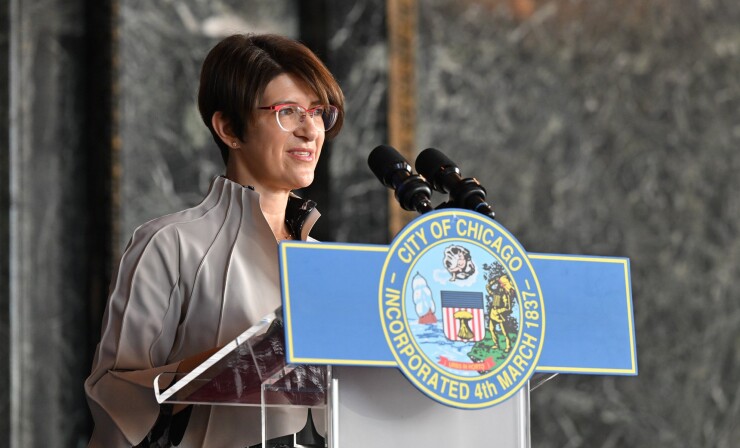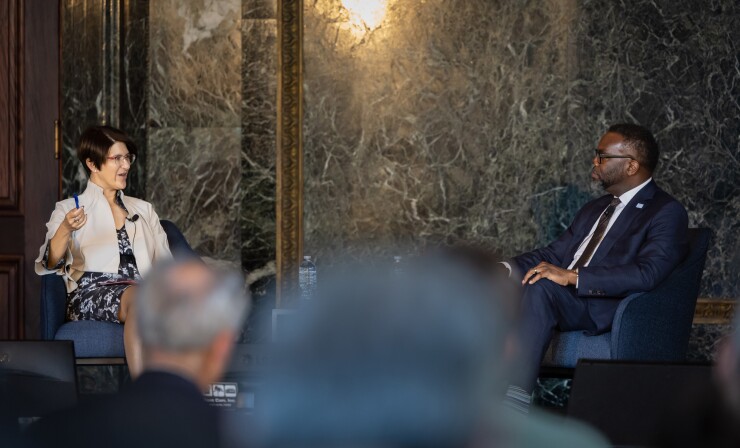Mayor Brandon Johnson's administration feels Chicago is being unfairly rated solely on its pension liability, despite its sizable population and what it calls the most diversified economy of any major U.S. city.
That's one of the takeaways from the 2024 Chicago Investors Conference, held on Friday at the Chicago Cultural Center in the Loop.
It opened with pointed remarks from Chief Financial Officer Jill Jaworski, who questioned whether the city is "getting properly rated" by the four rating agencies, which have significant sway over the trading levels of Chicago's bonds and the general perception of its credit quality.

It closed with the mayor's "lakeside chat," in which Johnson energetically defended his policies — including
"I give the city credit for reaching out to investors; I wish more cities would do that on a regular basis," said Howard Cure, partner and director of municipal bond research at Evercore Wealth Management, who attended the conference. "I found the individual contact with members of their staff particularly helpful."
Cure said Evercore has been "fairly active" in the city's airport, water and wastewater and transit authority bonds, and is looking for an opportunity to invest in the city's general obligation bonds.
"I have a lot of confidence in [the Chicago Finance Department's] senior staff — [Jaworski] has a breadth of experience and she's a good representative for the city." Cure said. "Really strong command of the financial aspect."
He noted it was "concerning" that there was no representative from Chicago Public Schools present at the conference.
"You have what I would consider a militant teachers' union… and there's going to be an
The school district, which has almost $9 billion of bond debt outstanding, has
Another concern, he said, is the upcoming reassessment by Cook County Assessor Fritz Kaegi, who was present at the conference.
"You worry with office vacancy rates what's going to happen with the reassessment," Cure said. "I'm not sure about the political elements that permeate this process and how much you can shift the burden, if there's a decline in commercial values, to residential."
Conference attendees also learned that the Johnson administration expects to spend "a lot of money" on O'Hare International Airport, the water system and the parks system, and that there are major investments in Chicago coming from United Airlines.
And they heard that the mayor's team is hitting the ground running on the $1.25 billion affordable housing and economic development bond program that passed City Council this spring, with the Department of Housing expecting to close on projects financed by the bond measure in the fourth quarter of this year.
Jaworski said the administration is expecting a surplus this year. She noted that over the past decade, Chicago has increased its annual pension contributions by 615%, or roughly $2 billion.
She displayed a bar graph showing that the corporate fund budget has risen steadily, especially over the last four years.
"It hasn't grown because of wasteful spending; it's grown because we've brought our liabilities into our budget, and we fully pay them now," she said. "In addition to paying our liabilities, our reserves have grown."
She also thanked the previous administrations of Lori Lightfoot and Rahm Emanuel for

On Chicago's debt load, including its pension liabilities, Jaworski noted that in 2023, the city made advance pension payments of over $240 million, and in 2024, it is making advance payments of over $300 million.
"Our advance pension funding policy is relatively simple: we're putting in enough money each year to make sure our unfunded liabilities don't grow," she said.
Chicago GO bonds carry ratings between Baa3 and A, and rating agencies
Officials also pointed to the city's status as the busiest freight rail hub in the nation, a hub for three top airlines (United, American and Southwest) and home to more than 400 major corporate headquarters, including more than 30 Fortune 500 companies.
When he took the stage, Johnson was eager to talk about his Cut the Tape initiative streamlining development and investment processes: "Some of it will require me to go before the City Council and get a vote," he noted. The initiative garnered praise from speakers on the business executive panel, particularly Pietro Cimiotta, CEO of Lagfin SCA, holding company of Campari Group, a premium spirits and branded beverages multinational.
Johnson suggested despite the defeat of Bring Chicago Home, he's not walking away from the homelessness issue. He said historical disinvestment in public housing "created the instability we're now experiencing." And he noted with some irritation that the real estate transfer tax he proposed was smaller than the Los Angeles and New York versions.
"We're not done, and we certainly are not discouraged," he said.
Johnson has formed a subcommittee dedicated to new revenue ideas, with the mayor favoring a tax on services and drawing encouragement from
Regarding
"Instead of working collaboratively, there's this attractiveness about being divisive," he said. As for Texas Gov. Greg Abbott, who by March had bussed
Even as he argued that migrant arrivals present "a real opportunity to grow our workforce" and estimated Chicago can fit 7,000 more people, Johnson acknowledged "there are some limitations to what we can do as a municipality."
"This mission is not sustainable without the help of the federal government," he said.
Johnson was upbeat about the Bears' stadium plans, which drew questions from investors about how he could support the new stadium given his other spending priorities. He reiterated that the Bears' plans met his three criteria: corporate investment, public access and public benefit. And he stressed that the Illinois Sports Facilities Authority "is designed to build stadiums."

Bears President and CEO Kevin Warren, who participated in the executive panel, spoke of a "quid pro quo relationship" with the city and said that as a Chicago resident, "I'm very cognizant of falling behind as a city."
Pointing to Las Vegas' Allegiant Stadium, built with a $750 million
"At a time when a lot of people are pulling their businesses out of Chicago," he said, he commended the mayor "for being bold in that area" of public-private partnerships.
Regarding the broader economy, Tom Walstrum, senior business economist at the Federal Reserve Bank of Chicago, said a soft landing is "still possible." But he acknowledged that progress on inflation has stalled, and said the greatest risk now is that inflation remains sticky.
"If the [inflation] numbers continue to come in hotter than 2%, then we might have to see that the Fed is going to hold rates higher… for longer than expected," he said.
He noted that while the Chicago metro area's economy has recovered from the pandemic, its jobs recovery has lagged the national employment recovery.
On the bright side, he said, Chicago is the third cheapest city to live in of the 20 largest U.S. metros, according to data from Zillow, an online real estate database. Only Detroit and Houston are cheaper. As for its downtown commercial real estate, he pointed to an opinion piece by
Chicago's effort to expand affordable housing across the city will get funding from its $1.25 billion bond measure. During the economic recovery panel, Department of Planning and Development Managing Deputy Commissioner Tim Jeffries said the administration will measure the effectiveness of that bond program through the property tax impact of its investments and through jobs created.
Department of Housing Commissioner Lissette Castaneda said affordable housing is the cornerstone of her department's work, with a current pipeline of 30 projects, some of them closing this year. She added that DOH is also looking at overall vacant space with an eye toward repurposing it. They're preparing to turn over about 500 plots of vacant land, she said.
Meanwhile, "people are back" at the McCormick Place convention center, said Metropolitan Pier and Exposition Authority CEO Larita Clark. The venue is on track this year to surpass 2019's $1.9 billion in economic impact. Companies tried virtual conventions during the COVID-19 pandemic, Clark said, "and that did not work."
As the event wrapped up, Jaworski pushed back on arguments that a tax on services would be regressive, noting that there has been a shift from spending on goods to spending on services that has shrunk the current tax base. She said such a tax would go to help the underfunded Chicago Transit Authority.
And she stressed that the Johnson administration is committed to managing its liabilities and "investing towards the future."
"We've really demonstrated our ability to change course," she said.





